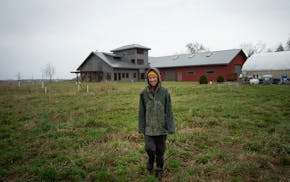Enough about spring. For homebuilders in the Twin Cities, summer is already here.
Municipalities around the metro area issued 520 permits to build 915 houses and apartments in March, a level of activity usually seen in summer months. The data, released Friday by the Builders Association of the Twin Cities and Keystone Report, amounts to the best March since 2006 for the region's home construction industry.
And it was one of those rare months when builders sought more permits for single-family houses than apartments, though both segments of the market are strong. "Builder confidence is very high," said Dave Siegel, executive director of the builders association. "They're all feeling pretty good."
Housing construction — both for sale and rental — is being driven by several demographic and economic factors. At the top of the list is the economic recovery, which is increasing demand for housing at a time when construction has been humming along but has remained below historic averages. Household formation in the Twin Cities metro has been on the rise, driven by gains in new jobs and a decoupling of shared households. For example, millennials are moving out of their parents' basements, and roommates are seeking their own digs.
Those young professionals are competing for rental apartments with a swelling wave of baby boomers who want a simpler, more mobile lifestyle.
"We're finally starting to see millennials moving into the home buying market," Siegel said. "The biggest challenge now is building entry-level homes."
Chris Harrington, a sales agent with ReMax Results, said the inventory shortage is particularly acute in Minneapolis.
He found a lot in northeast Minneapolis and built a three-bedroom, three-bathroom house on speculation. Though he's still putting the finishing touches on the house and hasn't listed it, he said interest has been surprisingly strong.
"I've already received a couple of verbal offers," Harrington said. "There's such limited inventory out there and it's just crazy."
New home sales across the country far exceeded expectations through February, federal data recently showed.
In the Twin Cities during March, Cambridge was the busiest market for construction, with 160 planned units; Plymouth was next with 133 and Apple Valley was third with 117 units.
"Builders will have a better year," said Herb Tousley, director of real estate programs at the University of St. Thomas. "2016 was a good year and 2017 will be even better."
For buyers, mortgage interest rates are expected to rise, but they have been fluctuating, creating a sense of urgency that didn't exist last year. That's happening as demand for entry-level houses has outpaced supply in some parts of the metro.
After steady increases earlier this year, mortgage rates have been trending lower. On Wednesday, Freddie Mac's Primary Mortgage Market Survey showed average mortgage rates dropping for the second consecutive week.
The 30-year fixed-rate mortgage averaged 4.14 percent this week, down from 4.23 percent last week. A year ago at this time, that rate averaged 3.71 percent.
The March building permit report covers the first weeks of the Builders Association's Spring Parade of Homes, the industry's biggest marketing event.
"We've heard great reports of high traffic during our Spring Parade of Homes and that more home buyers are looking," Bob Michels, the association's president, said. "With resale home inventory tight, we expect to see new construction continue to pick up the pace to meet the demand for housing."
Jim Buchta • 612-673-7376
Retired general's testimony links private contractor to Abu Ghraib abuses

